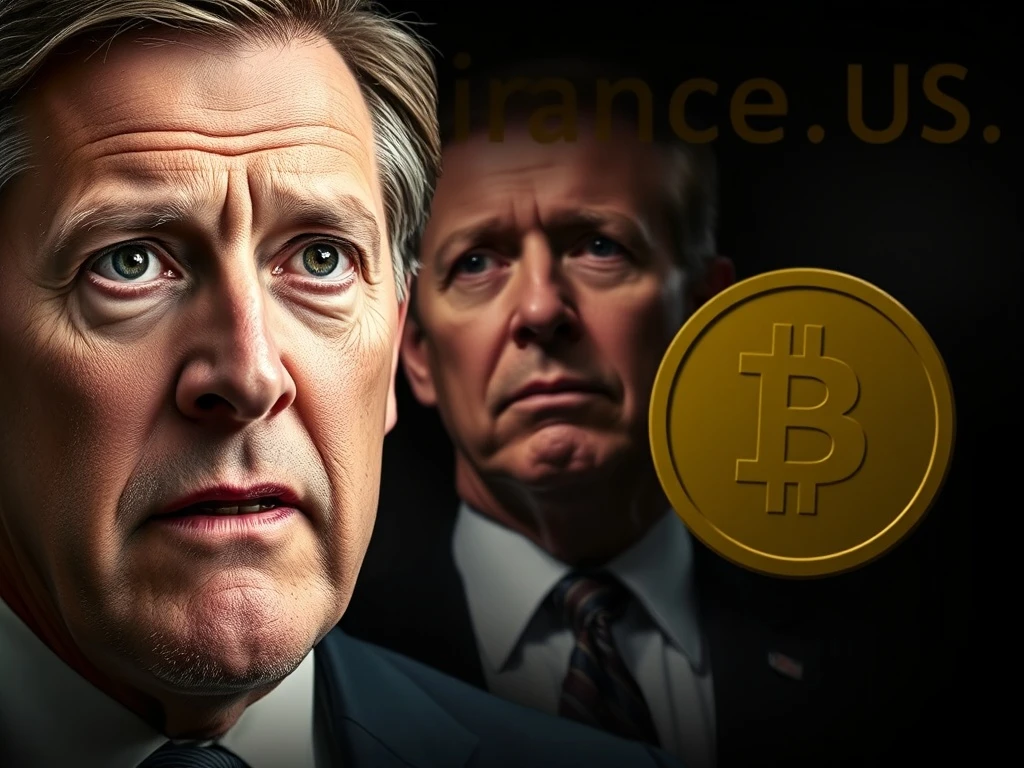Binance.US Under Fire: Senator Questions USD1 Stablecoin Launch After CZ Pardon

The cryptocurrency world often navigates complex intersections of finance, technology, and politics. Recently, a significant controversy has erupted, placing **Binance.US** at its center. This follows a high-profile presidential pardon and a new stablecoin launch. US Senator Chris Murphy has raised serious questions, alleging corruption surrounding the exchange’s decision to launch the USD1 stablecoin. This move came swiftly after former President Donald Trump issued a pardon for Binance founder Changpeng Zhao (CZ).
Senator Chris Murphy Alleges Corruption Over USD1 Stablecoin Launch
Connecticut Senator Chris Murphy did not mince words. He publicly called out **Binance.US**, suggesting the cryptocurrency exchange played a role in former President Donald Trump’s pardon of Changpeng “CZ” Zhao. Senator Murphy voiced his concerns in a Tuesday X post. He specifically responded to a social media announcement from Binance.US regarding the launch of trading for USD1. This stablecoin holds ties to the Trump family’s crypto company, World Liberty Financial.
According to Senator Murphy, the exchange was actively “promoting Trump crypto.” This promotion occurred just one week after the president “pardoned Binance’s owner,” referring directly to Zhao. This sequence of events immediately raised red flags for the senator and many others in the political and crypto spheres. Murphy’s allegations highlight a growing unease about potential quid pro quo arrangements in the digital asset space.
The Controversial CZ Pardon: A Timeline and Context
The **CZ pardon** on October 23 ignited considerable debate across the crypto community and within Congress. Changpeng Zhao, the founder of Binance, had faced significant legal challenges. He previously pleaded guilty to violating US anti-money laundering laws. In May, CZ confirmed he had applied for a presidential pardon. This application, however, became a focal point of scrutiny after its approval. Many observers questioned the motivations behind Trump’s decision. Some speculated about financial incentives. These incentives potentially included a reported $2 billion investment in Binance by an Abu Dhabi-based company, allegedly using the USD1 stablecoin.
The pardon itself sparked discussions on ethics and corruption. Critics argued that such a move could signal leniency for white-collar criminals in the crypto sector. Furthermore, it raised concerns about the integrity of the presidential pardon process. The timing, specifically preceding the USD1 launch on Binance.US, fueled these suspicions even further.
Understanding USD1 Stablecoin and Its Trump Crypto Connections
The **USD1 stablecoin** is central to this controversy. It is a digital asset pegged to the US dollar, designed to maintain a stable value. Importantly, USD1 is linked to World Liberty Financial, a crypto company associated with the Trump family. The launch of USD1 trading on Binance.US represents a significant step for this particular stablecoin. It provides increased liquidity and accessibility to a wider user base. However, this launch, coming so soon after the presidential pardon, casts a shadow of doubt.
The term “**Trump crypto**” used by Senator Murphy directly references this connection. It implies a perceived benefit or favoritism towards ventures associated with the former president. This narrative suggests a blurring of lines between political power and financial gain in the rapidly evolving cryptocurrency market. Consequently, the public and lawmakers demand greater transparency.
It is crucial to differentiate between Binance and Binance.US. While they share a name, these two companies operate as separate legal entities. Binance.US aims to comply with US regulations. Despite this distinction, the shared brand identity often leads to public confusion. This can amplify the impact of any controversy associated with either entity.
Widespread Scrutiny and Calls for Probes into the CZ Pardon
The **CZ pardon** has not only drawn the ire of Senator Murphy but also ignited broader outrage among lawmakers. Several members in both the House of Representatives and the Senate have called for thorough probes into the pardon. Others have openly criticized the decision. In a Tuesday letter addressed to the Justice Department, seven senators expressed grave concerns. They argued that the pardon “signals to cryptocurrency executives and other white-collar criminals that they can commit crimes with impunity.” This collective sentiment underscores a deep-seated worry about the precedent being set.
Moreover, on Monday, California Representative Ro Khanna announced his intention to introduce new legislation. This proposed bill would specifically prevent any US president, their family members, and members of Congress from trading cryptocurrencies or stocks. Khanna explicitly cited Zhao’s pardon as a primary motivator. He unequivocally labeled it “blatant corruption” emanating from the White House. Such legislative efforts reflect a growing demand for stricter ethical guidelines within government, particularly concerning financial dealings in emerging markets like crypto.
Ethical Implications and Future of Crypto Regulation
The ongoing controversy surrounding the **Binance.US** USD1 launch and the CZ pardon carries significant ethical implications. It highlights potential conflicts of interest when political power intersects with financial interests in the crypto space. The allegations of corruption, while unproven, contribute to a narrative that can erode public trust in both digital assets and government institutions. This erosion of trust could have far-reaching consequences for the nascent crypto industry.
Furthermore, these events will likely influence future discussions on cryptocurrency regulation in the United States. Lawmakers may push for more stringent oversight, increased transparency requirements, and stricter rules regarding political figures’ involvement in crypto ventures. The perception that powerful individuals can bypass legal consequences through political favors could spur a backlash, leading to a more restrictive regulatory environment. This situation underscores the need for clear ethical boundaries and robust enforcement mechanisms within the digital economy.
The $2 billion investment by an Abu Dhabi-based company using USD1 further complicates the narrative. This transaction, if linked to the pardon, would suggest a complex web of international finance and political influence. Such allegations demand thorough investigation to maintain integrity in both financial markets and governmental processes. The transparency of such large-scale investments becomes paramount in preventing future controversies.
Conclusion: Heightened Scrutiny on Trump Crypto and Beyond
The allegations by **Senator Chris Murphy** against Binance.US, concerning the USD1 stablecoin launch and its timing relative to the CZ pardon, represent a critical moment. They bring to light serious questions about ethical conduct, political influence, and the integrity of the cryptocurrency market. The debate surrounding “**Trump crypto**” and the broader implications of presidential pardons for financial crimes will undoubtedly continue. This saga emphasizes the urgent need for clarity and robust regulatory frameworks in the digital asset space. Ultimately, it highlights the continuous tension between innovation, profit, and public trust in the evolving world of cryptocurrency.









